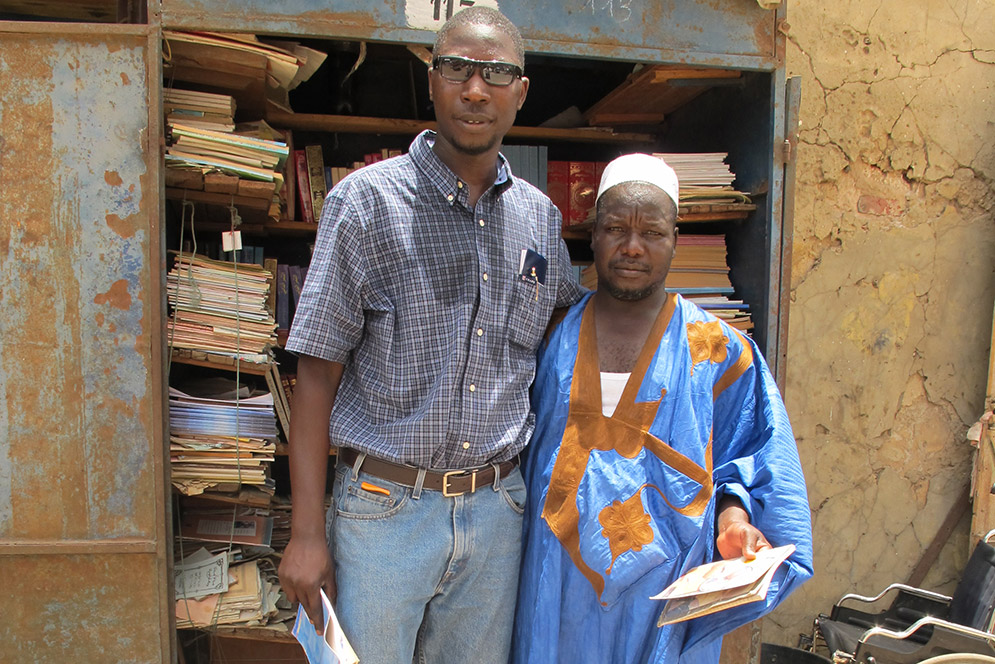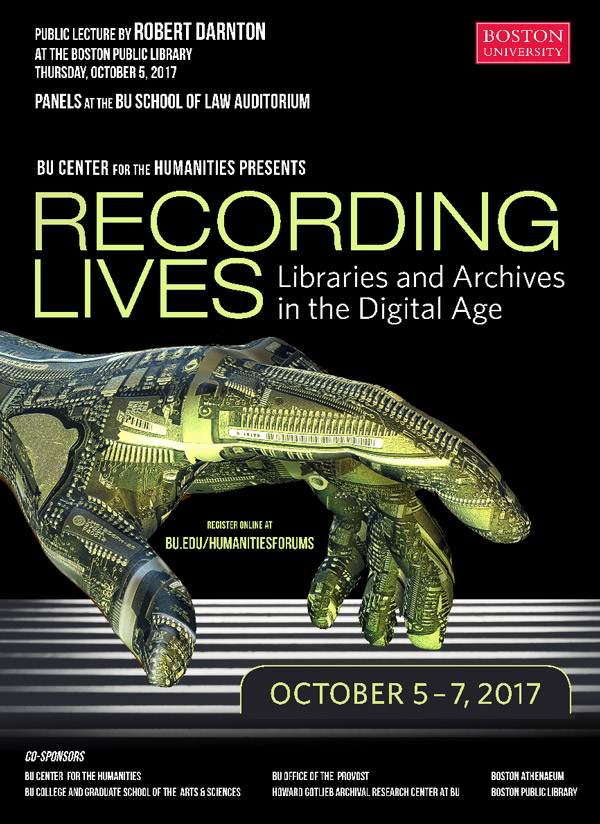Libraries and Archives Meet the Digital Age
Center for the Humanities three-day forum begins tonight at BPL

Fallou Ngom, a CAS professor of anthropology and director of the African Studies Center, with Amadou Ndiaye, an Ajami and Arabic bookseller in Saint-Louis, Senegal. Photo courtesy of Ablaye Diakité
“There is no country,
no culture that is not fundamentally interested in the subjects of libraries and of preserving its cultural treasures.”—Susan Mizruchi
For more than a decade, Fallou Ngom has worked to bring the Ajami language to the English-speaking world and to change the common misunderstanding of the written history of Africa.
Ajami is the writing system that African languages such as Hausa, Swahili, and Yoruba have used, with modified Arabic script, to keep records for centuries. It is found in villages all over Senegal, where Ngom grew up, as well as in Guinea, Niger, and other sub-Saharan countries, and it’s the method in those areas for recording anything from formal history to simple business transactions to poetry.
But that written record remains largely unknown to scholars around the world because of its physical inaccessibility and because for centuries the only written languages in the region acknowledged by the wider world were European. Ngom, a College of Arts & Sciences professor of anthropology and director of the African Studies Center at the Pardee School of Global Studies, has secured grants and traveled numerous times to Africa to digitize Ajami materials for study and put them online. His main personal goal is smashing the myth of African illiteracy.
“Before technology, you could only write about Africa using Colonial sources—French sources, English sources, Portuguese sources,” says Ngom. “What technology is now doing for us is to take those sources that were not known before and make them accessible to the world.”
That marriage of digital technology and traditional scholarship exemplifies key threads in this weekend’s Recording Lives: Libraries and Archives in the Digital Age, the first public forum sponsored by the BU Center for the Humanities.
“There is no country, no culture that is not fundamentally interested in the subjects of libraries and of preserving its cultural treasures,” says center director Susan Mizruchi, a CAS professor of English and the inaugural William Arrowsmith Professor in the Humanities. “Everyone is talking about digitization, everyone is talking in some way about preservation, about setting directions for the future.”
Over three days, Ngom and a score of other panelists will discuss the decisions we make as a society about what records we keep and how we keep them, exploring topics from open access to preserving diverse voices and the political, cultural, and societal implications of those decisions.
“I really think if a humanities center is going to have any right to exist, it needs to serve a public purpose,” Mizruchi says. “My goal in running this Humanities Center is to reach out beyond the University, in part as a means of demonstrating all that we have to offer. There’s so much great work being done at BU.”

Recording Lives begins tonight, Thursday, September 5, at 5:30 with a public lecture on Libraries, Books, and the Digital Future by Robert Darnton, Harvard University librarian emeritus, at the Boston Public Library’s Rabb Hall in Copley Square. As Harvard’s librarian from 2007 to 2015, Darnton “was on the cutting edge of a lot of questions that came up during the digital revolution,” Mizruchi says, from Google access to faculty publications to the future of printed books. He will be introduced by David Leonard, president of the BPL, with commentary by Christopher Ricks, BU’s William M. and Sara B. Warren Professor of the Humanities. A reception follows.
On Friday, the program moves to the School of Law Auditorium. The first panel (9 a.m. to 1 p.m.) focuses on Setting Directions for Libraries and Archives in the Digital Age, and will be introduced by BU’s Robert Hudson, University librarian, and moderated by Jack Ammerman, associate University librarian for digital initiatives and open access. Panelists include Vita Paladino (MET’79, SSW’93), director and curator of the Howard Gotlieb Archival Research Center, and representatives of the US National Archives and the National Library of Argentina.
The second panel, Digital Scholarship and Practice (2 to 5:30 p.m.), will be introduced by Peter Schwartz, a CAS associate professor of German and comparative literature, and moderated by Vika Zafrin (CAS’98), digital scholarship librarian at Mugar Memorial Library, with Ngom joining panelists from Stanford and the University of Illinois at Urbana-Champaign.
On Saturday, October 7, the forum starts with Preservation Spaces, Open and Closed (9 a.m. to 12:30 p.m.), introduced by Christopher Maurer, a CAS professor of Spanish, and moderated by Jeffrey Henderson, BU’s William Goodwin Aurelio Professor of Greek Language and Literature. It features panelists from the BPL, MIT, and others.
The final panel (1:30 to 5 p.m.) will tackle The Global Politics of Archives, with an introduction by Linda Heywood, a CAS professor of African American studies and of history, moderated by Maurice Lee, a CAS professor of English, with panelists from the Federal University of Rio de Janeiro, Heidelberg University, and others.
After a brief introduction, each panelist will speak for approximately 20 minutes, and each session will close with a panel discussion, which includes time for questions from the audience, led by the moderator.
Recording Lives: Libraries and Archives in the Digital Age will open with a 5:30 p.m. lecture tonight, Thursday, October 5, in the Boston Public Library’s Rabb Hall, 700 Boylston St., followed by panels Friday, October 6, and Saturday, October 7, at the BU School of Law Auditorium, 767 Commonwealth Ave. Find a schedule and online registration here.

Comments & Discussion
Boston University moderates comments to facilitate an informed, substantive, civil conversation. Abusive, profane, self-promotional, misleading, incoherent or off-topic comments will be rejected. Moderators are staffed during regular business hours (EST) and can only accept comments written in English. Statistics or facts must include a citation or a link to the citation.